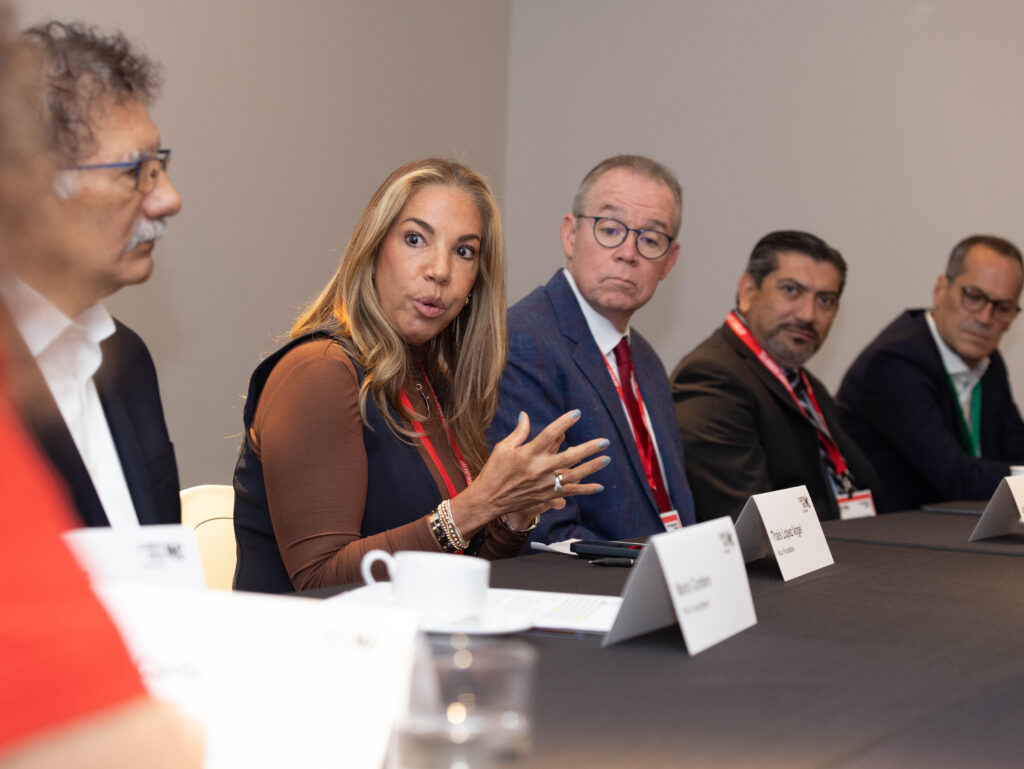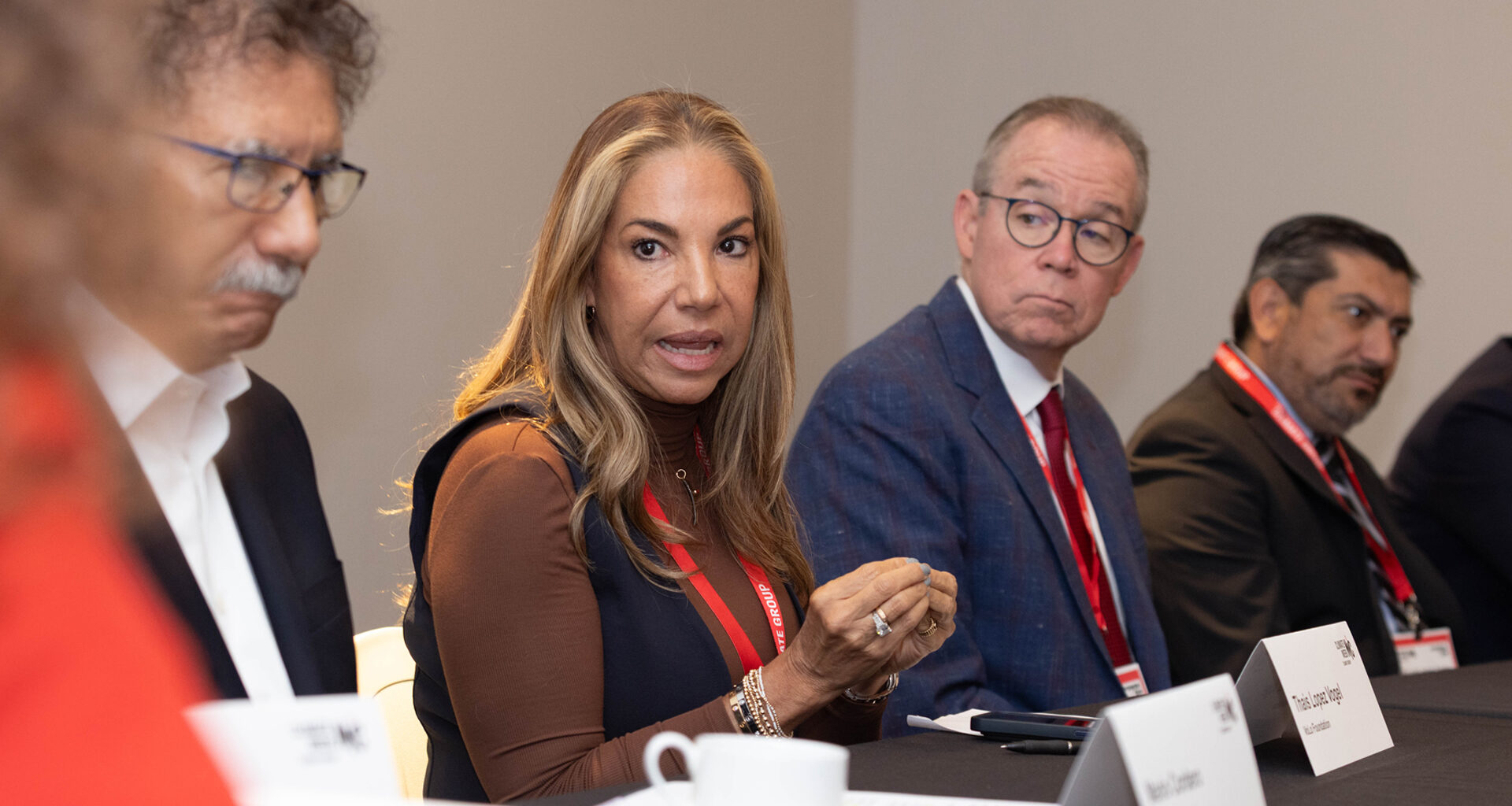By Carlos Roa, VoLo Foundation
At last week’s Climate Week NYC, the Spanish-language roundtable discussion “Climate Crossroads: Impacts and Action” was held on the first day. Convened by Climate Group and Climate Power in Action, the discussion brought together prominent leaders from different sectors to reflect before a group of journalists on the challenges and opportunities of climate action, with a special focus on Latino communities in the United States.
The panel included Thais Lopez Vogel, co-founder and trustee of VoLo Foundation; renowned meteorologist John Morales; Port of Long Beach Director Mario Cordero; Ricardo Javier Torres Hernández, deputy secretary of the government of the Mexican state of Querétaro; and Nespresso North America CEO Alfonso González Loeschen. The panel was moderated by Antonieta Cádiz, executive director of Climate Power in Action, and Ángela Barranco, executive director of Climate Group North America.
The philanthropic perspective
 Thais Lopez Vogel, co-founder and trustee of VoLo Foundation, speaks during the Spanish-language roundtable discussion “Climate Crossroads: Impacts and Action” at Climate Week NYC. (JC Campos photo)
Thais Lopez Vogel, co-founder and trustee of VoLo Foundation, speaks during the Spanish-language roundtable discussion “Climate Crossroads: Impacts and Action” at Climate Week NYC. (JC Campos photo)
Thais Lopez Vogel emphasized that philanthropy must remain focused on the goal, regardless of changes in administration or policy. “Our commitment is to clean air, resilient communities and the transition to clean energy. We believe in science, in reliable data and in the need to bring knowledge to the people,” she said.
For the co-founder and trustee of VoLo Foundation, philanthropy is not only an economic resource, but also a strategic tool capable of opening paths, taking bold risks and supporting frontline communities.
“We cannot depend solely on the government. Local action, universities, community leaders and private organizations are key to preparing and educating communities for what is to come,” she said, also calling for a message of optimism to be conveyed to the younger generations.
Ports and green jobs
From an infrastructure perspective, Mario Cordero explained how the Inflation Reduction Act enabled historic investments in ports to reduce emissions.
He recalled Long Beach, the largest container port in the United States in Southern California, pioneered its Green Port Policy 20 years ago and assured the energy transition in ports not only means cleaner air but also green jobs and new economic opportunities. He said they are always open to engaging with new partners who will enable them to advance these goals.
The scientific and regulatory challenge
Meteorologist John Morales drew attention to the recent elimination of 31 environmental regulations in the United States. He recalled that, in the past, the country was a global leader: “The Paris Agreement was achieved when the U.S. sat at the table.
“This is the country that has emitted the most greenhouse gases in history, and the world watches what we do or don’t do. The dismantling of regulations is a hard blow, but the rest of the world continues to move forward,” he said.
He noted Europe and China are moving forward on the path to sustainable energy. Even so, Morales emphasized progress in renewable alternatives and social pressure offer reasons for hope.
Lessons from Mexico
Deputy Secretary Ricardo Javier Torres Hernández explained the case of Querétaro, an industrialized state that has had to face the dilemma of maintaining its competitiveness without losing sight of the energy transition.
It is the second most economically complex state in Mexico and generates 2.5% of the country’s GDP. Its progress in effective climate policies is therefore an example to follow.
He pointed out that although dependence on fossil fuels persists, state policies have encouraged private participation and projects for electrification and waste management. “The challenge is to balance growing demand, such as the one generated by data centers, with a cleaner energy matrix,” he said.
The role of the private sector
From the business world, Alfonso González Loeschen shared the experience of Nespresso, which has committed to reducing emissions from its value chain by 75% by 2030. “Sustainability must be integrated across the board into business strategy.”
He stressed the importance of integrating sustainability into the heart of the business, building strategic partnerships and working hand in hand with 160,000 coffee farmers in 13 countries. “Sustainability is not just an environmental goal, it is about ensuring the future of coffee and the communities that produce it,” he said.
His formula: “Big ambitions, clear objectives and transparent measurement.” He concluded by highlighting the importance of partnerships: “We cannot do it alone.”
A necessary conversation
The roundtable, which brought together journalists from Latino media outlets in different states, sought to broaden the scope of the climate debate within the Hispanic community in the U.S., highlighting the role of the media as a bridge to bring information to frontline audiences.
The dialogue made it clear that, although the climate challenges are enormous, from the vulnerability of communities to political ups and downs, there are also multiple paths for action.
Philanthropy, science, state policies and private companies have complementary roles that are enhanced when they work together. As the panelists agreed, the key is not to lose focus: moving toward more resilient communities is imperative to achieving a future where sustainability is the cornerstone of economic and social progress.
Carlos Roa is senior press and PR director for VoLo Foundation. VoLo Foundation is a financial supporter of The Invading Sea. This piece was originally published at https://volofoundation.org/news/roundtable-discussion-in-spanish-kicks-off-climate-week-nyc/. Banner image: Another image of Thais Lopez Voge; at the panel discussion (JC Campos photo).
Sign up for The Invading Sea newsletter by visiting here. To support The Invading Sea, click here to make a donation. If you are interested in submitting an opinion piece to The Invading Sea, email Editor Nathan Crabbe at ncrabbe@fau.edu.
